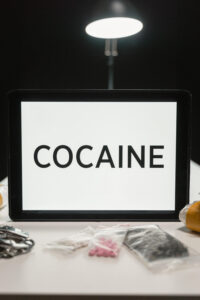In the complex web of addiction, there exists a significant relationship between cocaine use and mental health disorders. If you find yourself caught in the grip of cocaine addiction, it’s important to understand the profound impact it can have on your mental well-being.
While addiction is often seen as a symptom rather than the first line of treatment, it is crucial to first address the addiction. All worldwide treatment leaders agree that addiction is the primary issue. Without abstinence, mental health disorders continue to worsen. When seeking cocaine rehab, find a provider that recognizes the interconnectedness of cocaine use and mental health disorders.
Here are some key points to consider:
- Increased Risk of Mental Health Disorders: Cocaine use can significantly increase the risk of developing mental health disorders. Research has shown a strong association between cocaine addiction and conditions such as depression, anxiety disorders, bipolar disorder, and psychosis. It is essential to address both the addiction and any co-occurring mental health issues to achieve comprehensive and lasting recovery.
- Dual Diagnosis Treatment: Dual diagnosis treatment is an approach that addresses both substance use disorders and co-occurring mental health disorders simultaneously. It recognizes that treating addiction alone may not be sufficient for long-term recovery, as underlying mental health issues can contribute to ongoing substance abuse. Dual diagnosis treatment provides integrated care that focuses on the complex interplay between addiction and mental health, offering a more comprehensive approach to healing.
- Self-Medication and Coping Mechanisms: Many individuals with mental health disorders turn to cocaine as a form of self-medication or a way to cope with their symptoms. However, this self-medication often exacerbates the underlying mental health issues, leading to a dangerous cycle of dependence and worsening symptoms. It’s crucial to seek professional help to break free from this destructive pattern and develop healthier coping mechanisms.
- Neurochemical Imbalances: Cocaine use disrupts the delicate balance of neurotransmitters in the brain, leading to neurochemical imbalances. These imbalances can contribute to the development or exacerbation of mental health disorders. By seeking treatment, you can work towards restoring the chemical equilibrium in your brain and alleviating the symptoms of both addiction and mental health issues.
- Comprehensive Treatment Approach: To address the connection between cocaine use and mental health disorders, it is essential to seek a comprehensive treatment approach. This may include therapy, counselling, support groups, medication management, and holistic therapies. By engaging in a multifaceted treatment program, you can address the underlying causes of addiction, heal from mental health issues, and develop healthy coping strategies for long-term recovery.
Remember, your journey to recovery is unique, and there is hope for healing and growth. By seeking professional help, engaging in therapy, and surrounding yourself with a supportive community, you can break free from the cycle of addiction and mental health disorders. Embrace the wisdom of Eastern philosophies by nurturing your mind, body, and spirit, and by developing a deep sense of self-awareness and self-compassion.
These Tools Are Designed to Assist You in Navigating the Connection Between Cocaine Use and Mental Health Disorders

- Professional Therapy and Counseling
Engaging in therapy and counselling sessions with qualified professionals is a valuable tool for addressing the connection between cocaine use and mental health disorders. Therapy provides a safe and supportive space for you to explore the underlying causes of your addiction and mental health issues, develop healthier coping strategies, and gain insights into your thoughts and behaviours. - Dual Diagnosis Treatment Programs
Dual-diagnosis treatment programs specialize in addressing co-occurring substance use disorders and mental health disorders. These programs offer integrated care, providing you with a comprehensive treatment approach that addresses both aspects of your well-being. By receiving treatment for both addiction and mental health issues simultaneously, you can achieve more sustainable recovery outcomes. - Support Groups and Peer Support
Participating in support groups or connecting with peers who have similar experiences can be a valuable tool in your journey of recovery. Sharing your challenges, listening to other’s stories, and receiving support from individuals who understand can foster a sense of belonging and provide encouragement. Support groups can also offer practical insights and strategies for managing both addiction and mental health concerns. - Mindfulness and Meditation Practices
Incorporating mindfulness and meditation practices into your daily routine can be beneficial in managing the connection between cocaine use and mental health disorders. These practices help cultivate self-awareness, reduce stress, enhance emotional regulation, and promote a sense of calm. By being present in the moment and observing your thoughts and emotions without judgment, you can develop healthier responses to triggers and cravings. - Holistic Therapies and Self-Care
Engaging in holistic therapies and self-care practices can support your overall well-being and contribute to your recovery. Activities such as exercise, yoga, art therapy, and nature walks can enhance your physical and emotional well-being, reduce stress, and promote a positive mindset. Taking care of your physical health, practising self-compassion, and nurturing your spiritual side can all play a role in improving your overall recovery outcomes.
As you reflect on the profound connection between cocaine use and mental health disorders, remember that your journey to therapy and recovery is one of resilience, growth, and transformation. In the words of Maya Angelou, “You may encounter many defeats, but you must not be defeated. In fact, it may be necessary to encounter the defeats so you can know who you are, what you can rise from, how you can still come out of it.” Embrace this understanding as you embark on your path to healing.
The journey towards therapy and recovery requires courage, self-compassion, and a commitment to self-discovery. Acknowledge the connection between cocaine use and mental health disorders, and recognize that seeking professional help is a powerful step towards regaining control over your life. Through therapy, counselling, and support, you can unravel the underlying causes of addiction and address the challenges of mental health head-on.
In the therapy and recovery context, remember that you are not alone. Reach out for the support and guidance of professionals who understand the intricacies of addiction and mental health. Engage in therapy to gain a deeper understanding of yourself, develop healthier coping mechanisms, and cultivate resilience. Embrace the connection between your mind, body, and spirit, nurturing each aspect with care and compassion.
As you navigate the path to recovery, celebrate each small victory and embrace the lessons learned along the way. Believe in your ability to heal and grow, and surround yourself with a supportive community that uplifts and inspires you. With dedication, perseverance, and a holistic approach to healing, you can overcome the challenges posed by the connection between cocaine use and mental health disorders.
You possess within yourself the strength to rise above the challenges you face. Embrace therapy, connect with professional resources, and draw on the support of your loved ones. Together, let us walk this path of healing, knowing that transformation is possible, and a brighter future awaits.




